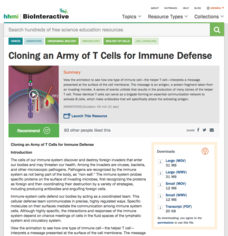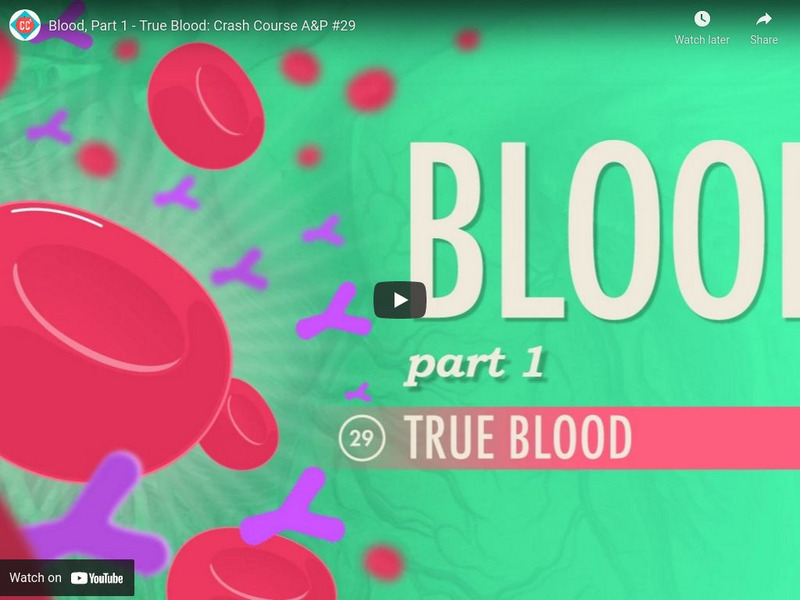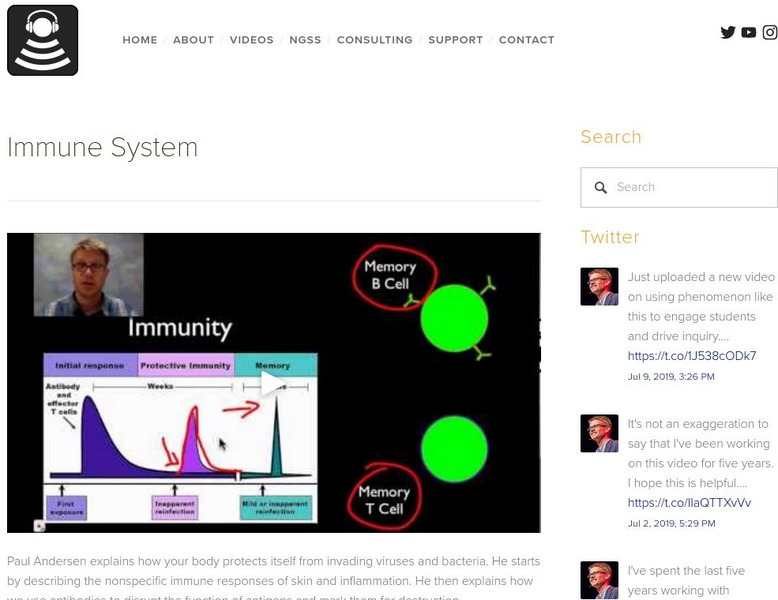Ancient Lights Media
How do we acquire immunity to bacteria and viruses?
Acquiring Immunity - Viruses/Immunity Set - Part 3, This clip offers a step by step look at how the human body develops immunity to infectious diseases.
Curated Video
The Role of White Blood Cells in the Immune System
The video provides an explanation of how the immune system works to defend the body against infection from pathogens, using white blood cells. It focuses on two types of white blood cells, phagocytes and lymphocytes, describing their...
FuseSchool
Blood groups
Imagine you’ve been involved in an accident. You’re bleeding and are rushed to the hospital. Thankfully you’re given a blood transfusion, to replace your lost blood. But you can’t just have blood from any old donor... In fact, when...
Ancient Lights Media
How do vaccines work?
Understanding Vaccines - Viruses/Immunity Set - Part 4. This clips examines how vaccines are made and how they are able to produce immunity to infectious diseases.
FuseSchool
What are Antibodies
If this is the first time you have heard about antibodies, you may not know how important they are. Antibodies are one of the warriors inside our body, helping us to fight off nasty, invading particles. They are a type of protein, and...
Bloomberg
Boddities | Episode 11 | Why do bug bites cause skin bumps?
When mosquitos feast on your blood they deposit toxins under the skin that can cause swelling. The severity of the swelling depends on your immune system.
Bozeman Science
Cell Communication
Humans have taken communication to every corner of the Earth, yet our bodies, at the cellular level, have communicated without technology for millions of years. Learners view the variety of ways cells can communicate, whether right...
Khan Academy
Cytotoxic T Cells, Immune System Physiology, NCLEX-RN
Sal explains how every cell in our body can present a sample of the proteins inside it, in order to signal that it is compromised. A concise summary to help students understand the complex system of alerting a T cell and initiating the...
Be Smart
The Deadliest Flu Season in History?
Is it possible for another flu outbreak like the Spanish Flu in 1918? A video lesson explains the factors that affect the spread of a virus and its effect on a population. The narrator describes the structure of the different virus...
Howard Hughes Medical Institute
Cloning an Army of T Cells for Immune Defense
How do bodies fight infections and illnesses? An animation of the way T cells clone to fight an infection provides many details. The resource also provides an excellent written introduction and ideas for how to ensure pupils understand...
Howard Hughes Medical Institute
Antigen Presentation and CTL
How does your body know when to present an immune response? Viewers observe how antigen presentation triggers the response and how this treatment helps attack viruses before they spread. The video also discusses the challenges of...
Crash Course
Blood – True Blood (Part 1)
Teach your class about human blood and explain why donation is so important using the 29th video in a series of 47. Learners explore the basic components of blood, how cuts stop bleeding, and how antigens determine blood types.
Bozeman Science
Blood Types
Young scientists learn the importance of knowing blood types and their compatibility. The instructor in the video explains each type of blood and their antigens and antibodies, and then differentiates between AB blood and Rh blood...
Bozeman Science
Immune System
Flu vaccines work by calling on the immune system to produce antibodies against the virus without actually infecting the individual with the flu. Here class members see how a virus enters cells and the body defends itself. The...
Amoeba Sisters
Multiple Alleles (ABO Blood Types) and Punnett Squares
Whatever you do in life, always give 100 percent—unless you are donating blood. A video explains how to solve Punnett squares with multiple alleles, in this case blood types. It includes what happens if the wrong type is added,...
Curated OER
Allergies - Hypersensitivity
Why are your eyes so watery? Why is your nose running? You may have allergies! Watch this video for an in-depth look at allergies. A narrator defines allergies alongside a slide show of great images.
Curated OER
Understanding Allergies
Why isn't your immune system fighting against those allergies? In this video you will learn that the immune system detects allergens as harmless. Check out this video to learn more!
Curated OER
Types of Allergies
This video takes an in depth look at four types of allergies: rhinitis, asthma, atopic dermatitis, and food allergies. Viewers will learn the differences between these allergies and what causes them. There are fantastic images in this...
Crash Course
Crash Course A&p #29: Blood, Part 1 True Blood
Now that we've talked about your blood vessels, we're going to zoom in a little closer and talk about your blood itself. We'll start by outlining the basic components of blood -- including erythrocytes, leukocytes, platelets, and plasma...
Bozeman Science
Bozeman Science: Immune System
Paul Andersen explains how your body protects itself from invading viruses and bacteria. He starts by describing the nonspecific immune responses of skin and inflammation. He then explains how we use antibodies to disrupt the function of...
Amoeba Sisters
Amoeba Sisters: Blood Types and Punnett Squares (Multiple Alleles)
A baby was switched at the hospital! How will the Amoeba Sisters figure out who are the correct set of parents? Follow the process and learn about inherited characteristics such as blood type in this video. [7:04]















